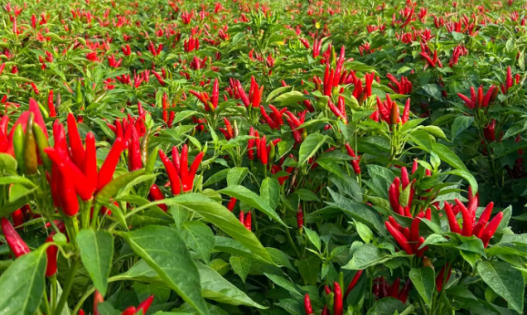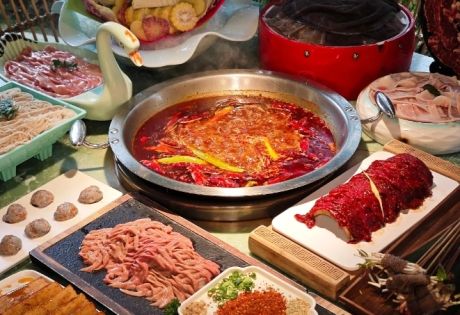If you’ve ever tasted authentic Sichuan cuisine, you’ll remember it forever — the fiery red chili oil, the numbing tingle of Sichuan peppercorns, and the addictive balance of heat and flavor that leaves you craving more. But have you ever wondered why Sichuan people love spicy food so much? The answer lies not just in taste, but also in geography, climate, history, and even biology. Let’s uncover the real science (and culture) behind Sichuan’s obsession with spice.
Geography and Climate: Fighting Dampness with Heat
Sichuan Province sits in a basin surrounded by mountains, where the air is often humid and misty. Winters are damp and bone-chilling, while summers can feel heavy and muggy. In traditional Chinese medicine (TCM), such an environment is described as “cold and wet,” conditions that can disturb the body’s internal balance.

Why Spice Helps:
Chili peppers are considered “yang” (warming) foods in TCM. Eating spicy food helps dispel internal cold, stimulate circulation, and even improve digestion. The locals believe that spice drives away humidity and illness, making it the perfect culinary defense against Sichuan’s unique climate.
“In a place where the air feels heavy, spice lightens your spirit,” as a local saying goes.
A Historical Love Affair: From Chili’s Arrival to Cultural Identity
Interestingly, chili peppers are not native to China. They were introduced from the Americas in the late Ming Dynasty (around the 16th century). Before that, Sichuan cuisine was flavorful but not necessarily spicy.
When chilies arrived, Sichuanese cooks immediately embraced them. Why? Because chili thrived in Sichuan’s moist soil and warm climate, and it offered a cheap, accessible way to preserve and flavor food. Within a few generations, chili became inseparable from Sichuan’s identity — not just an ingredient, but a cultural symbol of boldness and warmth.
Today, the phrase “吃得辣” (being able to eat spicy food) is seen as a badge of pride in Sichuan.
The Role of Sichuan Peppercorn: More Than Just Spice
No discussion of Sichuan cuisine is complete without mentioning Sichuan peppercorns (花椒 huājiāo) — the tiny, citrus-scented seeds that create the signature má là (麻辣) sensation, a combination of numbing and spicy.
Scientifically, Sichuan peppercorns contain hydroxy-alpha-sanshool, a compound that activates touch and temperature receptors on the tongue. It doesn’t burn like chili; it tingles and vibrates, tricking your brain into thinking your mouth is buzzing.
When combined with capsaicin (the chemical that makes chili hot), the result is a multi-layered experience that’s both stimulating and oddly pleasurable. This má là balance is what makes Sichuan food unique — it’s not just heat, but heat with rhythm.
Psychological and Biological Addictions: The Pleasure of Pain
There’s real science behind the “spicy addiction.” When you eat something spicy, your body reacts as if it’s in mild pain. The brain releases endorphins and dopamine — natural chemicals that create feelings of pleasure and happiness.
Sichuan people, who grow up eating chili from a young age, develop both tolerance and craving for this sensation. Over time, their brains associate spice with comfort, appetite, and even joy.
Eating spice becomes not just a habit — but an emotional need, especially in cold, damp weather.
Social and Cultural Dimensions: Spice Brings People Together
In Sichuan, food is never just about nourishment. It’s a social experience. From late-night hotpot gatherings to family dinners, spicy food is central to community life.
Why Spice Works Socially:
-
Hotpot (火锅) encourages sharing and conversation — everyone cooks from the same pot, building connection.

Hot Pot
-
Bold flavors reflect Sichuan people’s lively, straightforward personality — they’re known for being passionate and humorous.
-
Even the heat tolerance becomes a topic of friendly competition: “Can you handle the Level 10 spice?”
In many ways, eating spicy food together strengthens cultural bonds and local pride.
The Science of Spice Tolerance
Research shows that regular chili consumers develop desensitization over time. Their pain receptors adapt, allowing them to enjoy stronger flavors without discomfort. Sichuan people, exposed to chili from childhood, have higher thresholds for spice and often find non-spicy food “too bland.”
Interestingly, studies also suggest that spicy food may boost metabolism, reduce inflammation, and enhance mood — providing biological reasons behind Sichuan’s long-lasting love affair with chili.
Spice as an Expression of Character
Beyond taste and health, spice represents something deeper in Sichuan’s culture — a reflection of the people themselves.
Life in the Sichuan Basin has not always been easy: floods, isolation, and humid weather once made it a challenging place to live. Yet, locals are known for their optimism, humor, and bold spirit. The way they eat mirrors their way of life: vibrant, unafraid, and full of fire.
To understand Sichuan people, start with a bowl of má là hotpot — it’s culture in its most delicious form.
Iconic Spicy Dishes You Should Try
If you’re traveling through Chengdu or Chongqing, here are must-try dishes that define Sichuan’s spicy identity:
| Dish | Description | Spice Level |
|---|---|---|
| Chongqing Hotpot (重庆火锅) | A bubbling cauldron of chili oil and peppercorn broth | 🔥🔥🔥🔥🔥 |
| Mapo Tofu (麻婆豆腐) | Silky tofu with minced beef and spicy bean paste | 🔥🔥🔥 |
| Shuizhu Beef (水煮牛肉) | Tender beef slices bathed in chili broth | 🔥🔥🔥🔥 |
| Dan Dan Noodles (担担面) | Spicy sesame noodles with chili oil and minced pork | 🔥🔥 |
| Lazi Chicken (辣子鸡) | Crispy chicken buried under mountains of dried chili | 🔥🔥🔥🔥 |
Each dish tells a story — not just of flavor, but of the region’s history, creativity, and resilience.
Conclusion
So, why do Sichuan people love spicy food? Because it’s more than a taste — it’s a way of life. It reflects their environment, strengthens their bodies, lifts their spirits, and expresses their personality. From ancient medical wisdom to modern neuroscience, the science behind Sichuan spice explains why it continues to captivate the world.
If you’re planning to experience Sichuan cuisine firsthand, join a food and culture tour with China Dragon Travel — and discover how the heat of chili connects you to the warmth of the Sichuan spirit.












